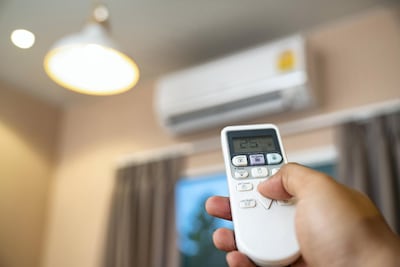When Joaquin Ablatico took a long, hard look at his finances, he decided to switch off his air conditioning whenever he left his Dubai apartment, a move he says has halved his Dewa bill.
“The change was huge,” says the 29-year-old Spanish marketer, who has lived in the emirate for a year in the Downtown area near Dubai Mall. “People leave their air conditioning on all the time here during summer and it’s very expensive.”
By turning off the AC when he went to work each day or out at the weekends, he reduced his monthly bill from Dh820 to Dh410.
Cooling and air conditioning represents 70 per cent of the UAE’s electricity use during the summer months, according to Powerwise, an Abu Dhabi government office focusing on awareness of electricity use.
Some 3.3 million refrigeration tonnes of cooling is used in Dubai alone at the summer peak, according to the UAE State of Energy Report from the Ministry of Energy, requiring almost five gigawatts of electricity generation capacity. To put that into context, that is 1,000 times as much as will be created by the millions of solar photovoltaic panels being installed at the five-megawatt Mohammed Bin Rashid Al Maktoum Solar Park.
But despite our massive demand, only just over a third (36 per cent) of residents in the UAE are mindful of their electricity consumption and waste, according to a recent survey by Dubai classifieds site Dubizzle.
The best way to cut air conditioning costs, and load on the power network, is to set the thermostat to 24 Celsius, Dewa and the Abu Dhabi Distribution Company (ADDC) both say - the optimal temperature for the body. Even turning the thermostat up by one degree can save up to six per cent of your electricity consumption, Powerwise says.
However, in a climate where the average maximum temperature drops below 24C for only one month a year and the average minimum temperature is above that level six months a year, a cool home is inevitably key to a comfortable summer.
Traditionally residents in the UAE have only worried about their AC use when the bill comes in, but increasingly people are starting to care about their energy consumption for environmental reasons too. According to a June YouGov survey, 61 per cent of UAE residents try to regularly set the AC to 24C or above.
Mr Ablatico says he does other things to keep his home energy use low, “for financial reasons, obviously, but also for social responsibility”. He turns off the hot water when he goes on holiday and only puts on the washing machine once a week, eschewing the dishwasher totally in favour of washing dishes by hand.
But does his practice of turning off the AC help? It may reduce his bills immediately but when you consider servicing – and health – costs, it’s better just to turn the dial up, says Fadil Nwilati, chief executive of property management company Kaizen Asset Management Services. Turning the AC off can cause humidity levels in the home to soar, creating “a perfect environment for bugs and mould”.
Set the thermostat to 24C and keep humidity to 40-55 per cent, he advises. This means the AC will cycle on every so often, and keep the humidity balanced and the nasties away from your air vents. The Natural Resources Defense Council, a US environmental advocacy group, also says this is the most inexpensive route, as air conditioning systems operate most efficiently at full speed during longer periods.
Top tips to help keep your AC bill down:
Change AC filters
To keep your AC running efficiently, change the AC filter regularly, says Mr Nwilati, of Kaizen Asset Management Services. He recommends swapping it out every three months - and even monthly if it runs continuously. A dirty filter could add 15 per cent to your utilities bill, he says, with filter cleaning costing Dh150-350 per unit. “Clogged, dirty filters block normal airflow and reduce a system’s efficiency significantly,” he adds. “In some instances, your AC will stop cooling.”
Close the blinds
Bright sunlight is your AC system’s “nemesis”, says Mr Nwilati. Keep your home cool by closing blinds and using black-out curtain linings. You could also install special coverings that decrease heat gain by 25-33 per cent, such as UV reflection film, costing from Dh500 per square metre, to blinds with a highly reflective finish or even automated window dressings that adjust according to sunlight patterns.
Use a fan
Using a ceiling fan can make a room feel up to 10 degrees cooler, yet uses just 10 per cent of the energy of a central air conditioner, the NRDC says. But only put a fan on when someone is in the room; fans recirculate the air already present to cool your skin when you are in the room, rather than cooling the room itself.
Check for cracks and leaks
If you can (this may be harder in an apartment), stand outside your home and feel along windows and doors. If you can feel cold air escaping, you can add insulation around doors, use filler to plug the leaks around windows or seal the bottoms of doors off by attaching ‘sweeps’ or ‘shoes’. The NRDC says all the gaps around windows and doors in the average American home add up to a hole of almost a metre by a metre.
Replace old AC units
If your AC unit is getting old, replacing it could mean you cut 40 per cent off the running costs, Powerwise says. Look for a Seasonable Energy Efficacy Rating (SEER) rating of 13 or above and the Emirates Quality Mark label and Abu Dhabi Trustmark, which show the unit is energy-efficient. Make sure you pick one that’s the right size – too small for the space and it will struggle to chill the air but if it’s too big it will cool the room too quickly without removing enough humidity, leaving you cold but still clammy. The size is measured in British Thermal Units (BTUs) and calculators can easily be found online but the rough rule of thumb is 20 BTU per square foot of living space.
Install a smart thermostat
You can save thousands on your annual AC bill by automatically raising the temperature when you’re at work or away from home, Mr Nwilati says. The Nest smart thermostat, which identifies temperature patterns and builds a schedule around them, is available from Etisalat for Dh950 plus installation costs, while Honeywell also has some smart thermostats available in the UAE.
“As a tenant you need to get permission from a landlord to do any upgrades but, as a landlord, it can only benefit you and your tenants to install smart home technology and improve energy savings,” he adds. “Installation costs can be recovered quickly.”
Or a programmable thermostat
Even a non-smart programmable thermostat can cut energy consumption by 20-30 per cent, according to the NRDC. If you have window units, you could even look at adding an appliance timer.
Create cross-winds
Like the traditional Gulf wind towers you see in Dubai’s Bastakiya district, it may be worth experimenting with opening two windows to create cross-breezes. Open two windows on the same floor, or in the same room, a crack to create a draft - although this will require experimentation.



